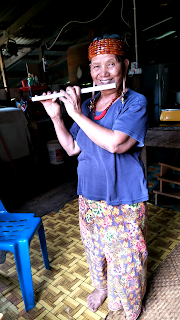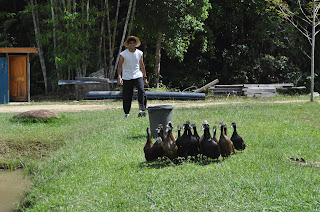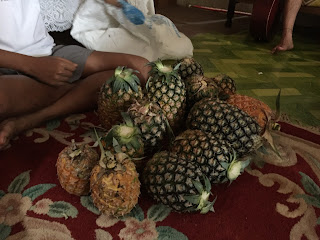She made me realize the little things in life.
Every morning from 8am to 12pm, two of my friends and I will walk through muddy roads to arrive to another village called Kampung Arur Dalan to spend a few hours helping our tepuqs with their paddy fields - removing seedlings from the nursery itself and planting them in a bigger sawah (aka paddy field).
Tjia Ern, I and Clovey from left to right
Upon my first day with Tepuq Do Ayu, I was already excited and in the move to communicate with her since the WHEE participants' main purpose was to collect data from our tepuqs by asking questions in an informal way.
I realized that every time I communicated with her, she never failed to look me in the eyes and replied me.
( Left: Tepuq was planting rice, Right: * started speaking and she looked up and smiled to the camera*)
Fast forward a few days on when my planting skills were getting a little bit more handy, I realized how painful it was to bend up after bending down for long minutes.
Here's tepuq Do Ayu and I-
After the first day of paddy planting, I was drenched in mud and she washed me up telling me to clean the corners of my pants that were not cleaned before even cleaning herself up.
That really made me feel a whole lot more comfortable moving around the longhouse and sitting on the chair next to the famous 'window' in her house with the hot coffee she had made for both Rhon and I!
Rhon took this photo while sitting on a stool
The upcoming days were unexpected, all I knew was that we were going to have a performance over the weekend and only the following Monday, I will continue data collection again with Tepuq Do Ayu.
Our few hours together on the first day were sweet - we managed to finish everything before the rain started pouring, and her capacity to love was already showing.
Here's a photo of Tepuq Do Ayu and I after church!
My friend - Tjia Ern was actually the one that spotted the tepuqs from Kampung Arur Dalan leaving Sunday church and we rushed through the doors and onto the road to stop both of our tepuqs - hugging them and asking them how are they were going home.
By then, I have learned some simple Kelabit sayings such as " You look pretty ", so I said that to Tepuq Do Ayu which she replied with a smile, "Why didn't you sit with me in church just now?" (translated into English) , and that was tepuq's way of showing her love to me.
Day 2 was slightly different.
I got to rest in tepuq's farm after a few hours of rice planting and was generously served with coffee, biscuits and pineapple by Tepuq Do Ayu.
Within those moments, she also began telling me about her stories of how this shelter was built by her husband and how the doors behind us was to avoid dogs from entering etc.
This is tepuq laki ( how Tepuq Do Ayu calls her husband) and he helped bring our bucket of seedlings around from one end to another that day
Tepuq Do Ayu and Tepuq Laki have a special relationship that somehow made me smiled through their conversations that I could not understand.
All I knew was Tepuq Laki enjoys walking and Tepuq Do Ayu always laughed and smiled whenever I mentioned Tepuq Laki is walking 'again', haha :)
There was once when we were washing up, Tepuq Do Ayu actually shrugged me to a corner just so she could spray water at her husband to tease him.
The outcome was laughter and a little bit of Kelabit words that eventually represented seriousness.
At Tepuq Do Ayu's place, she never failed to ask her family to eat first before she starts eating too!
Everyday, ever since day 2 of working with Tepuq Do Ayu, she served me with home cooked food and always, with Nuba Laya - mashed rice wrapped in an Isip leaf.
The last day in the paddy field with Tepuq Do Ayu was special.
We were both very focused with our work and occasionally, she looked to me to see if I was planting my rice correctly and of course, to check my well-being.
She also brought me back to her house for a rest and served me more food -
That day, we finally finished her plot of sawa!
She also performed with her traditional 'toy' she used to play when she was younger! Tepuq Do Ayu is really talented when it comes to arts and music, and that was really cute to witness.
(Tepuq and I were having this conversation about sports she used to play when she was younger - and she mentioned volleyball and this instrument!)
The last day was when I get to spend more time with Tepuq Do Ayu when we went around her pineapple farm to hunt for pineapples!
It was also that night where unexpected events happened such as tears and a performance together in front of everyone in the longhouse!
That was one day before we were to leave Bario. And I remembered Tepuq Do Ayu silently shrugging my shoulder while I stood next to her saying, "Senyum" , which means "Smile" while we took a group photo together!
Tepuq Do Ayu really taught me to love silently, without boast. Her little actions and her way of being had taught me a lot through these nine days in Bario, where I continued thinking of her even though it was my free day. Thank you Tepuq Do Ayu.




























































